An apology is in order, readers. It's safe to say I've been lax in my movie reviewing duties. Before last week's review of François Ozon's “Frantz,” I hadn't written anything on these pages for several months. No 2016 best/worst lists? Inexcusable. No thinkpiece on that big Oscar snafu that robbed Best Picture winner “Moonlight” of its big golden moment? It boggles the mind. No coverage of this year's Miami Film Festival? I was at Disney with friends for half of it. (Now that you mention it, what's with the “International”-less rebranding?)
Life, as well as the sci-fi stinker “Life,” got in the way, but I emerge from my mini-sabbatical with plenty of catching up to do.
The first three months of 2017 may have brought the usual dumping-ground studio stinkers, most of which I successfully avoided. But they also brought the release of some award-season latecomers to South Florida shores. I've been keeping tabs on many of these titles, so here are some brief impressions from what might shape up to be a most intriguing year at the cinema ... despite a new “Transformers” movie from Michael Bay coming in June.
Without further ado, here are reviews of four films I've caught at local multiplexes and arthouses in January, with some of the ones I saw in February and March to follow in coming weeks. All four of these titles are currently out on DVD and/or Blu-ray.
Silence
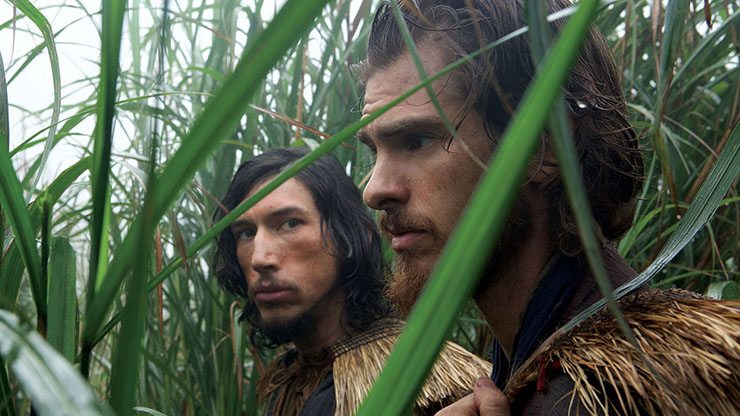
Photographer: Photo credit: Kerry Brown
Adam Driver, Andrew Garfield
The first hour of Martin Scorsese's long-gestating passion project, which chronicles the faith-based trials and tribulations of two Portuguese Jesuit missionaries in 17th century Japan, is a punishing ordeal, mostly by design. Despite arresting cinematography by the dependable Rodrigo Prieto, roughly the first hour and change of this austere, 161-minute historical drama, the third entry in the auteur's religion-themed trilogy following “The Last Temptation of Christ” and “Kundun,” is a tough slog, and not always a rewarding one.
Fathers Sebastião Rodrigues (baby-faced Andrew Garfield) and Francisco Garupe (lanky Adam Driver) receive news that their mentor, Father Cristóvãu Ferreira (Liam Neeson, better than he's been in ages) has renounced Catholicism while performing missionary work in the East Asian country. This must be untrue, his idealistic protégés argue to fellow Jesuit Alessandro Valignano (a way underused Ciarán Hinds), so off they go into hostile territory, against the stern warnings of Valignano, an Italian man of the cloth, so naturally their scenes together are shot in heavily accented English.
What the younger men find in the land of the rising sun is Christian devotion gone into hiding, believers of modest means who dare not speak aloud of their spiritual leanings, lest they incur the wrath of a cruel and unforgiving shogunate hellbent on weeding out their territory of Western vermin. But Scorsese maintains viewers at arm's length and adopts a plodding pace when more narrative momentum would have worked wonders. He also shoots quite a few of the initial scenes in Japan in English, a crippling compromise that prevented this critic from fully immersing myself.
But once Rodrigues and Garupe come face to face with their foes (a clash between a culture of guilt and a culture of shame) “Silence” becomes a far more gripping meditation on spiritual violence and the ways steadfast adherence to dogma can do more harm than good. (It helps that, as the film progresses, Scorsese opts to shoot more and more scenes in Japanese.)
When Rodrigues' faith is shaken to the core, particularly toward the end of the film, you feel it in your bones. This dense adaptation of Shūsaku Endō's historical novel, one of the year's first casualties at the North American box office, thanks to Paramount's poor handling of its theatrical release, could have used more of its final hour's visceral charge, but it puts Scorsese in the company of filmmakers like Bergman and Dreyer as an uncompromising explorer of belief on celluloid.
There is also a spiritual kinship between Rodrigues' crisis of the soul and Newland Archer's unrequited romantic yearnings in Scorsese's adaptation of Edith Wharton's “The Age of Innocence,” which, like “Silence,” was co-scripted by former film critic Jay Cocks. If you missed it in theaters, and think you're up to the challenge of scaling this mountain of a movie, it's well worth seeking out.
Julieta
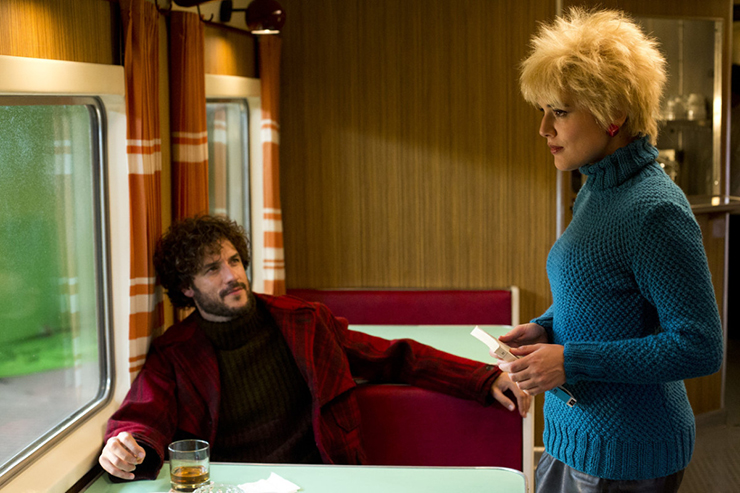
Daniel Grao, Adriana Ugarte
Scorsese's not the only director delving into the ripple effects of guilt across an extended period of time. Pedro Almodóvar's latest offering, an adaptation of three short stories by Canadian author Alice Munro, is a lush hybrid of Alfred Hitchcock and Douglas Sirk, a tough-minded melodrama that pairs the celebrated Spanish filmmaker's penchant for saturated colors with a woman's quest to come to terms with her life choices.
It kicks into gears when the Madrid-based title character (Emma Suárez) runs into her daughter Antía's childhood friend, who tells her she ran into Antía while vacationing in Italy. The chance encounter triggers a strong urge in Julieta to reconnect with her estranged offspring, so she backs out of moving to Portugal with her boyfriend Lorenzo (“Talk to Her's” Darío Grandinetti), as the couple had planned. “I'd rather be on my own,” she tells a dumbfounded Lorenzo.
Julieta then moves back into the apartment building where she raised Antía and, surrounded by memories from the past, she puts pen to paper and begins a journal. Almodóvar then takes us back in time to a fateful train journey where his protagonist, played as a younger woman by Adriana Ugarte, meets Xoan (hunky Daniel Grao), Antía's dad.
A fisherman by trade, Xoan, whose wife is in a coma (shades of “Talk to Her”), is immediately drawn to Julieta, who in these early flashback scenes bears an uncanny resemblance to Melanie Griffith in “Something Wild.” The challenging romance that follows is the film's strongest section: straightforward and confidently rendered.
But as “Julieta” shifts back and forth in chronology, the obstacles Almodóvar throws in the main character's path begin to pile up, muddying up the film's nonlinear structure. Lost in the shuffle is the relationship that's ostensibly the central one, that of Julieta and Antía. The latter character, in particular, goes through so many shifts in behavior that she starts coming across as more of a plot device than a fully fleshed out character. The turn of events that cements her estrangement with her mother ends up feeling abstract and unearned.
This would be a lot easier to take if the director sprinkled in some of his trademark humor, but he plays it deadly earnest here. Almodóvar has made an intelligent, finely crafted character study, but also one that's needlessly overwrought. He's spinning his wheels in order to dramatize Julieta's introspective journey, and making matters even more frustrating, he quits before showing us the reunion toward which the movie appeared to be heading. As disappointments go, it's an engaging and resonant one, but also increasingly dreary. I'm still waiting for that ending, Pedro...
The Tenth Man
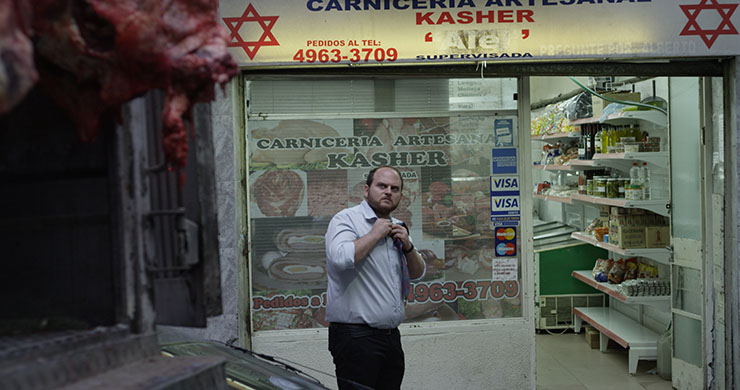
Alan Sabbagh
There may have been better, more high-profile movies playing at this year's Miami Jewish Film Festival, but none of the ones I saw were more fun than this slim, sneakily disarming comedy set in Buenos Aires' El Once Jewish neighborhood. The story centers around Ariel (Argentinean star Alan Sabbagh), a New York City-based economist who flies back to his childhood home, mostly to introduce his dad, Usher (Usher Barilka) to his ballerina girlfriend. The complications begin when his current squeeze, whom he barely get to see (and neither do we; she remains a distant presence on Ariel's cellphone and laptop screen), delays her trip in order to attend an audition.
Things go further downhill for Ariel once he's back in South America. Usher, who heads a Jewish aid foundation, keeps entrusting his son to run errand after errand, all while remaining out of reach to the flustered travel. Ariel, who sports a ginger beard, a receding headline, more than a few extra pounds and unresolved daddy issues, is sent on a seemingly endless goose chase through his old stomping grounds, triggering old memories that writer-director Daniel Burman (“Lost Embrace”) lovingly brings to life in brief flashbacks.
In between running into relatives and old buddies, Ariel becomes an on-the-go problem solver for a steady stream of community issues, most hilariously dealing with an irate butcher looking to settle a score with Usher. In the process, he lends a helping hand and becomes smitten by Eva (“Wild Tales'” Julieta Sylberberg), an Orthodox woman battling her own demons.
“The Tenth Man” only runs 82 minutes, but by the time it's over, you feel like you've become deeply familiar with its characters, their neuroses and the frequently chaotic streets they travel on. Burman tends to favor a naturalistic, rough-hewn mise en scene, and here it turns what could have come across as contrived into a buoyant, admirably sour character study. The movie places the heaviest burden on Sabbagh's shoulders, and the bearish actor, whose deadpan comedic chops recall Louis C.K., delivers in spades.
Burman's disarming tale may feel minor and slight while you're watching it, but it deepens in retrospect. Here I am, singing this modestly scaled winner's praises months later. It's quite lovely.
Split
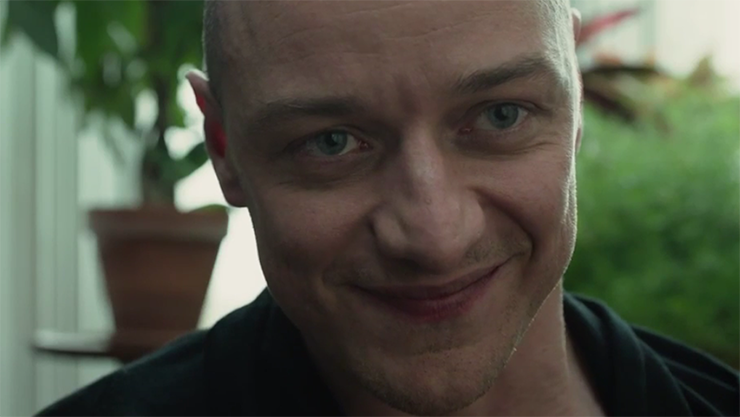
James McAvoy
It's beginning to look like 2017 is on its way to becoming a banner year for the horror genre at the movies, a notion that got its start with the runaway success of M. Night Shyamalan's multiple-personality urban legend, ably headlined by a scenery-chomping James McAvoy. Gone are the stilted found footage trappings that sank the Philly-based auteur's unwatchable, egregiously overpraised Hansel-and-Gretel riff “The Visit.” In their place is the brooding, meticulous formal approach that first put him on the map, and for much of its running time, “Split” marks a return to form for the “Sixth Sense” and “Unbreakable” helmer. At least until the bone-crunching starts.
The film's resilient heroine/audience surrogate is withdrawn wallflower Casey Cooke (Miami native Anya Taylor-Joy), the frequent object of her classmates' contempt. As the movie opens, suburban princesses Claire (Haley Lu Richardson) and Marcia (Jessica Sula) are making fun of their mousy tagalong at Claire's birthday party. The snickering stops when a bespectacled stranger finds his way into Claire's dad's car and kidnaps the three teens. The trio wake up in a locked room in what they soon discover is the labyrinthine dwelling of “Dennis” (McAvoy), one of 23 personalities residing in Kevin Wendell's body. (Very mild spoilers follow.)
Shyamalan wisely chooses to downplay typical captive/captor content that a more conventional filmmaker would have focused on, instead zeroing in on the eclectic grab bag of weirdos jostling for control of Kevin's body. McAvoy doesn't disappoint, whether he's frightening the girls as the gruff “Dennis,” asking them to play as scared 9-year-old “Hedwig” or (and this one is my favorite) scolding them as matronly Brit “Patricia.”
But the film's secret weapon is Kevin's shrink, Dr. Karen Fletcher, played by a game Betty Buckley, and as long as she and McAvoy are sharing the screen in her office, “Split” is a hoot and a half. The good doctor acts as sounding board for her patient's personalities, and watching the characters interact, you feel Shyamalan's mojo beginning to come back.
More problematic is Casey's dysfunctional family background. In flashbacks, we discover she was molested by a close family member, but the backstory only serves to establish a sort of psychological connection with Kevin. The filmmaker all too conveniently keeps the more unsavory material offscreen, lest he lose that PG-13 rating he may not have earned after all. Taylor-Joy, so good in “The Witch” (and, it should not go unmentioned, one of the few bright spots in the sci-fi dud “Morgan”), gives it her all as the “straight man” opposite McAvoy, but because he denies the viewer the chance to experience the extent of her anguish, Casey's scars remain pretty abstract. Kevin's identities, ironically enough, feel more real.
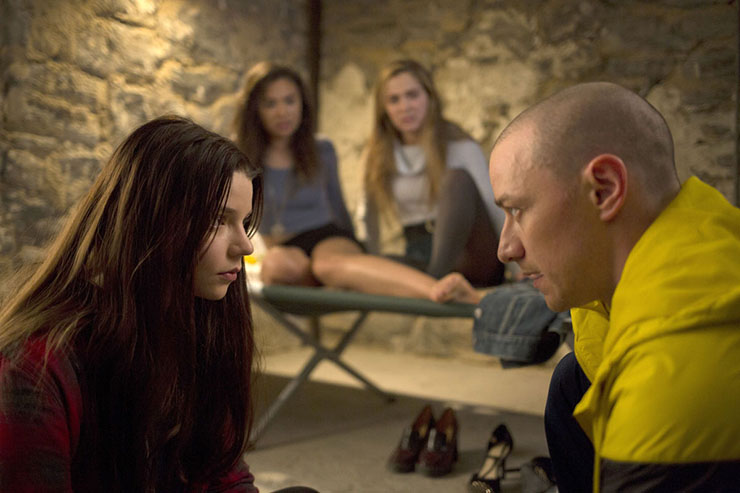
Anya Taylor-Joy, Jessica Sula, Haley Lu Richardson, James McAvoy
But let's give credit where credit is due: Shyamalan deftly navigates a minefield rife with the possibility of aesthetic lapses, and for a good three-quarters of the way, he avoids succumbing to the schlocky tendencies that tend to mar his work. Alas, he just can't help himself, and after engaging the viewer as a delectable portrait of multiple personality disorder, “Split” bares its fangs in trashy, astonishingly uninspired ways.
Dr. Fletcher, you see, begins to fear claims of a 24th personality lurking deep inside Kevin, dubbed “The Beast,” might actually be valid. Once the psychiatrist leaves the safety of her practice and chooses to enter her patient's world, Shyamalam throws logic and plausibility out the window in the name of creeping his audience out. Look, I'm always up for cheap genre thrills, but the mean-spirited shenanigans that plague “Split's” third act derail a story that should have centered on Kevin's fragmented psyche.
It all ends with a neat Easter egg that suggests Shyamalan is not quite done with a particular character from his earlier films, but he appears to have twisted himself, and his newest movie, into a pretzel in order to arrival at this fanboy-catnip moment. Not to downplay what a quantum leap “Split” is when compared with the filmmaker's sorry output since the underrated “The Village” … back in 2004. Here's hoping this near miss is a harbinger of better things to come.
Up next, in February's Winter Movie Catchup, I suit up for LEGO's take on the Caped Crusader, dive into Gore Verbinski's murky Europudding waters, travel to the Dark Continent with Belle” director Amma Asante and examine Wes Craven's influence on ... Jordan Peele?!




